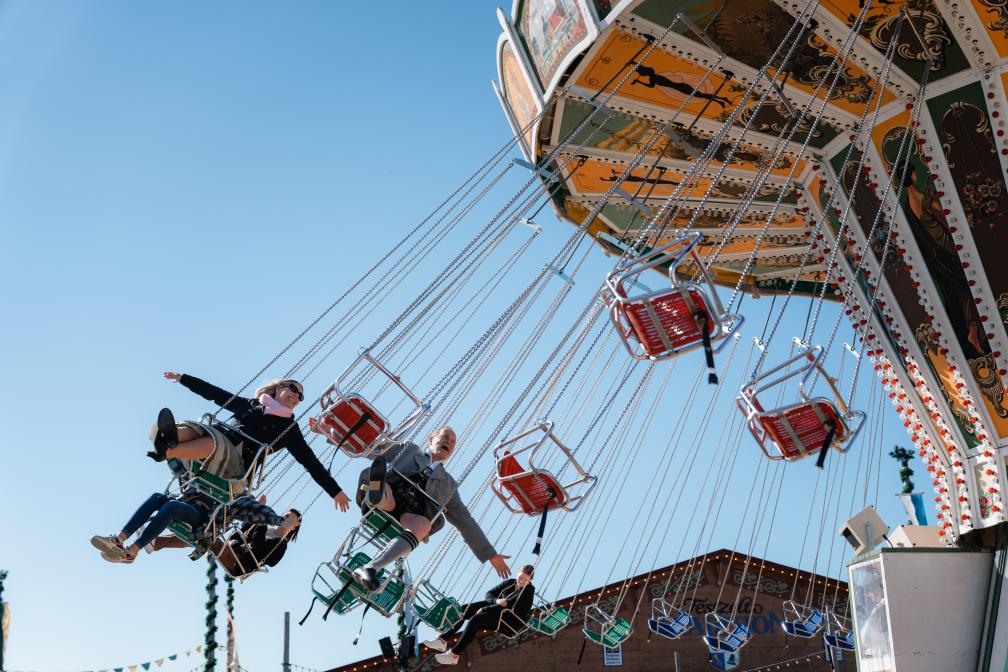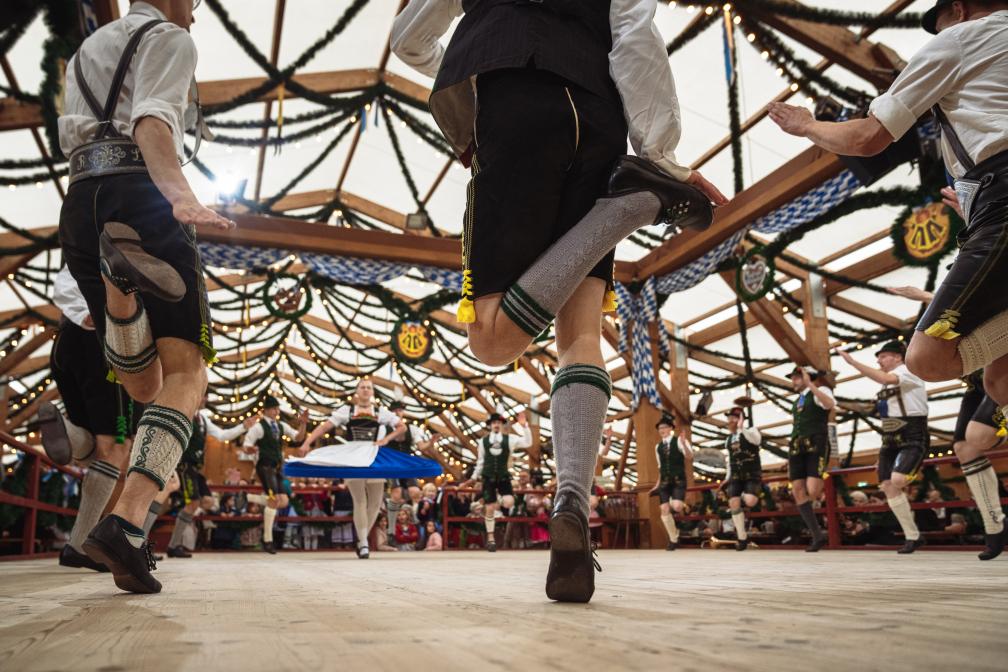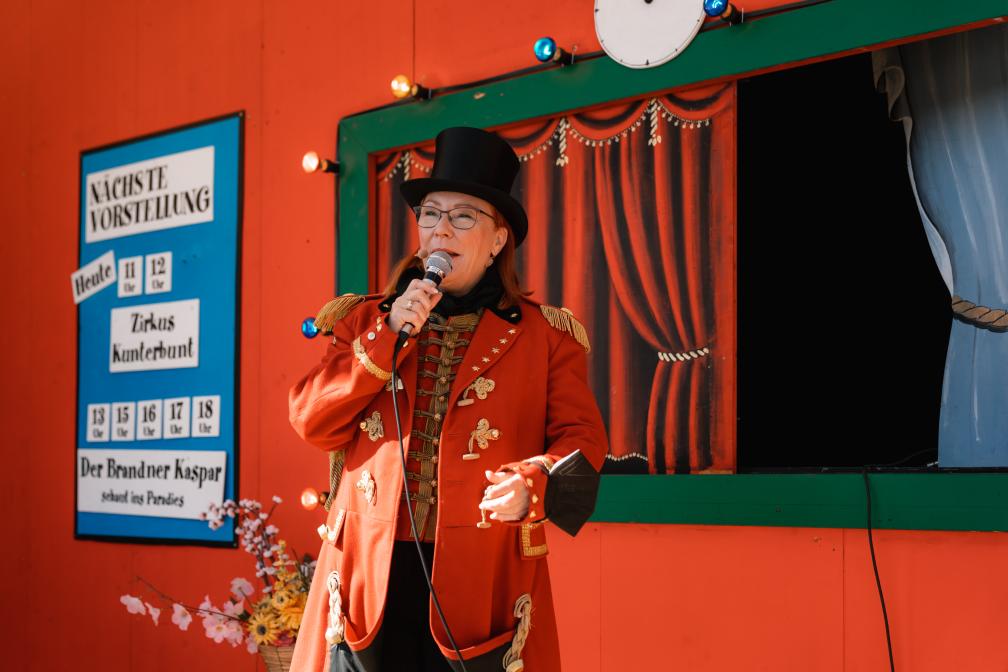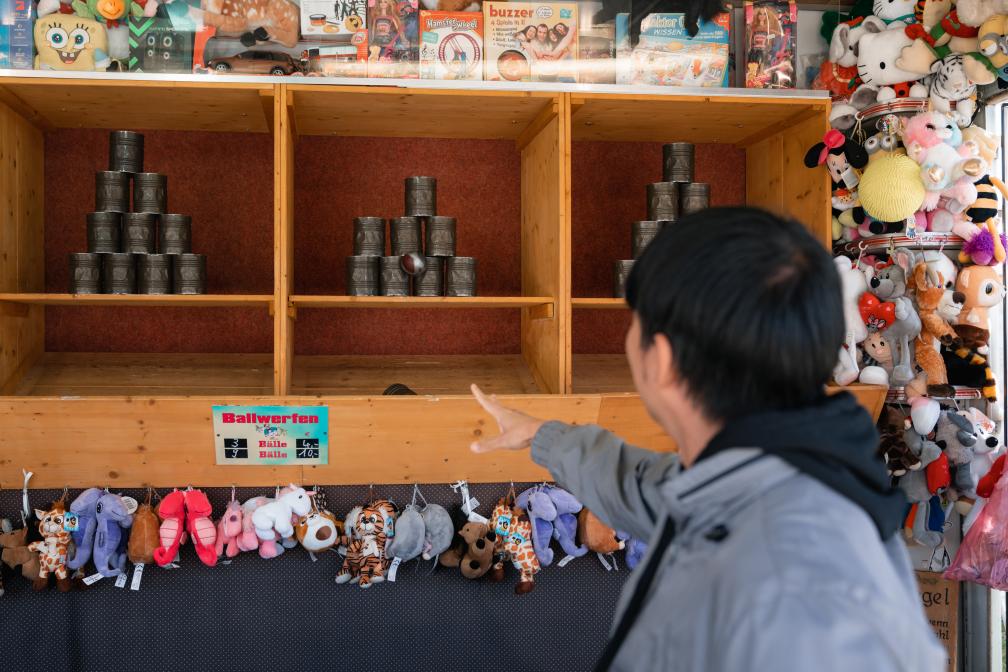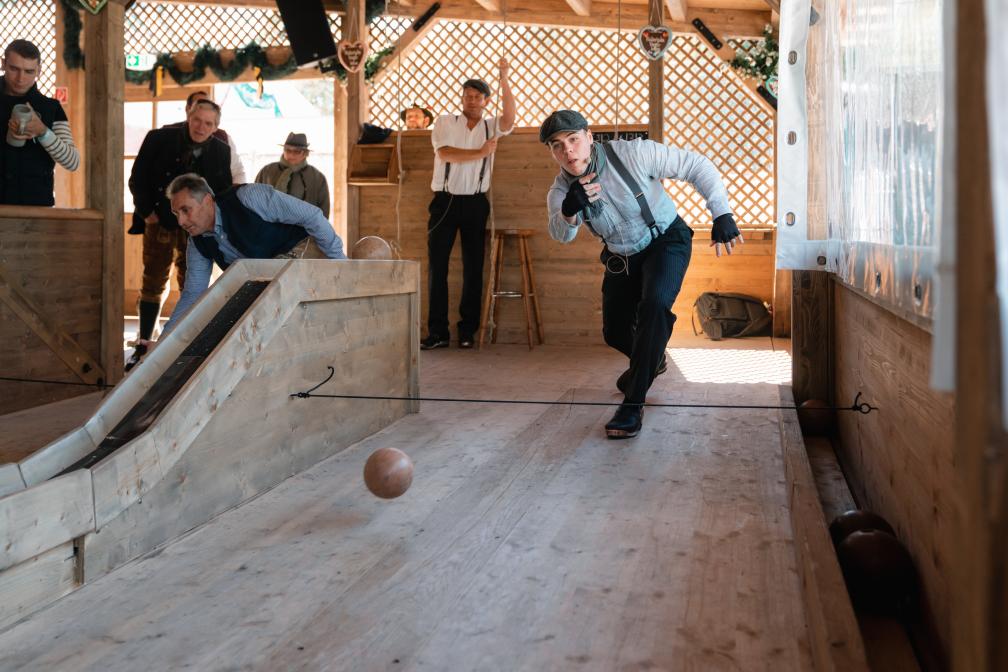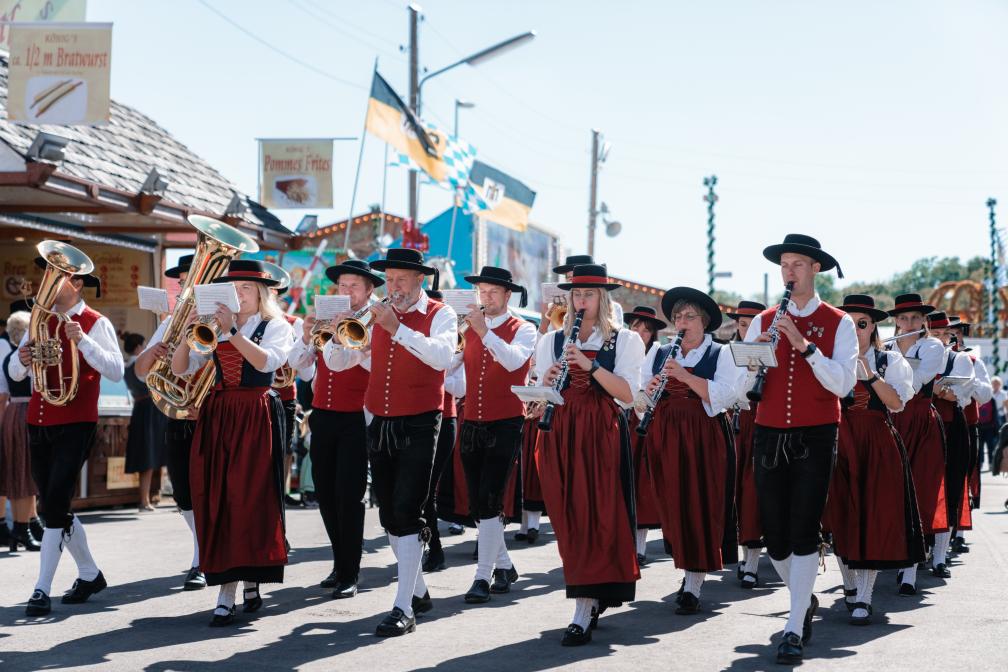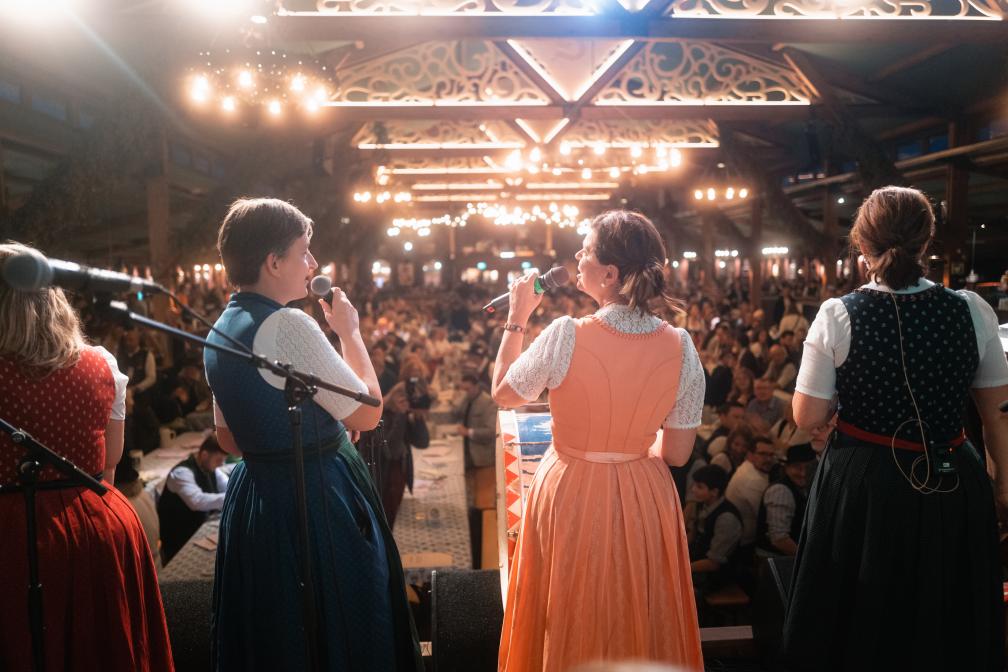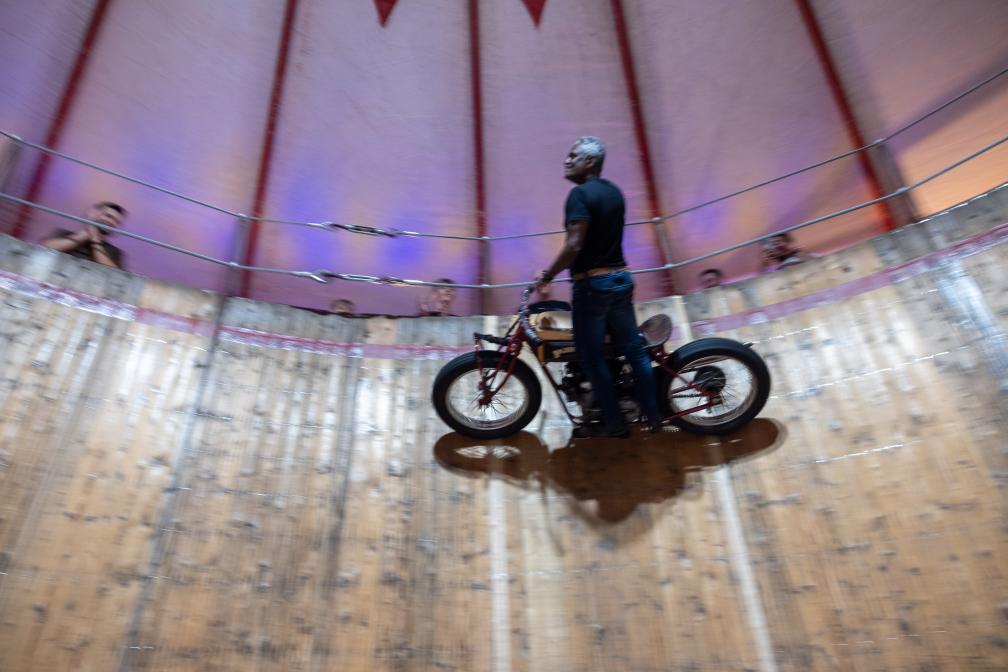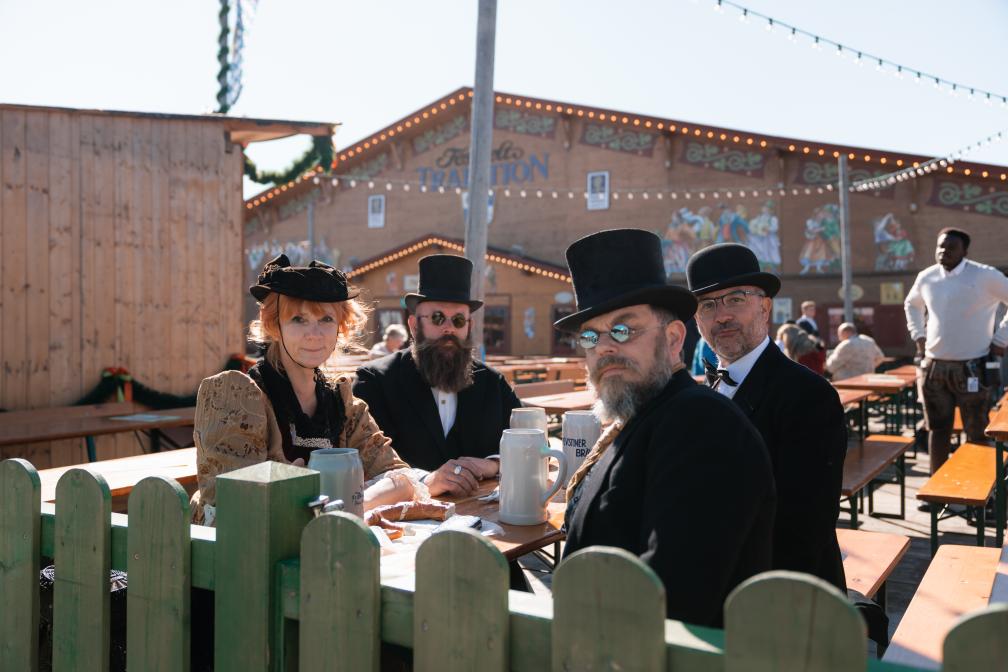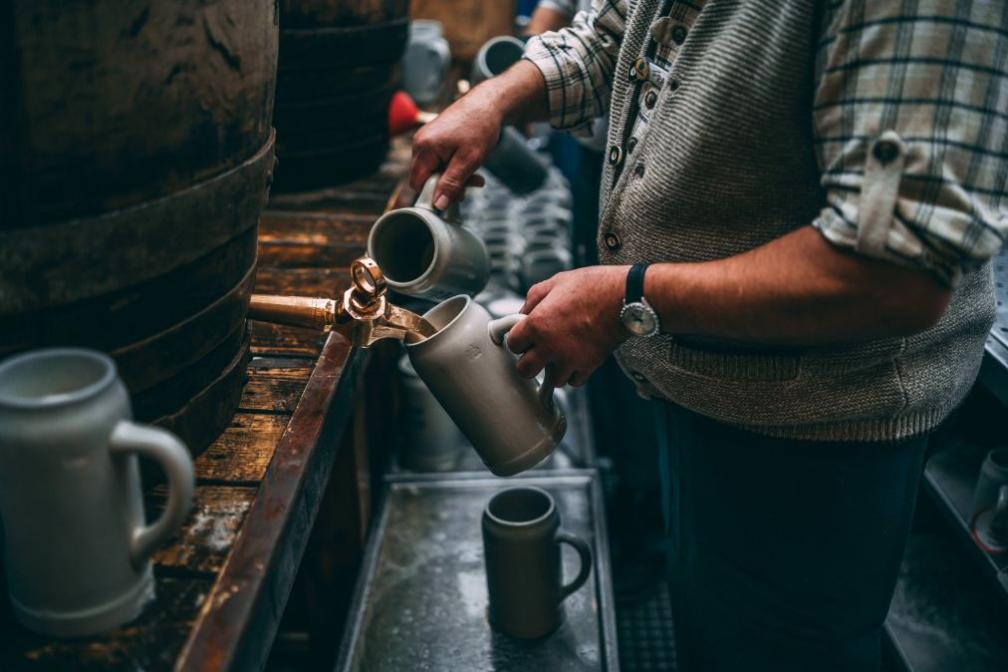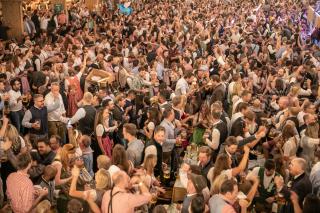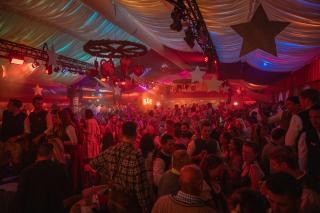Tents and fairground attractions at the Oidn Wiesn
The nostalgic “Oide Wiesn” awaits with festival tents, historic rides and stalls. What is on offer on the festival grounds in the southern part of the Theresienwiese.
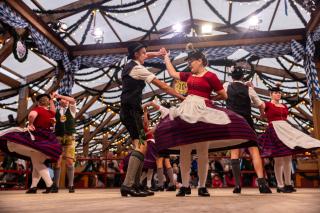
Admission prices & opening hours at a glance
- Grounds: 3.5 hectares in the southernmost part of Theresienwiese
- Entrance: around 4 euros per person (free entry from 9 p.m. — only via the exits!) Free entry for children up to 14 years of age and 50% off for disabled people with a valid pass; anyone accompanying a person who presents a disabled person’s pass marked with the letter B also has free entry
- Tickets include free entry to the cultural program at festival tents
- Tickets are available at the entrance on site and online at München Ticket
- Rides: 1.50 Euro
- Opening hours of festival tents:
- 10 a.m. to 11:30 p.m. (Bar: 10 a.m. to 10:30 p.m.)
- Opening hours for performers:
- On the first day from midday to midnight
- Monday to Thursday from 10 a.m. until 11:30 p.m.
- Friday, Saturday, and Montag, October 2, from 10 a.m until midnight
- Sunday and on the holiday (October 3) from 10 a.m. until 11:30 p.m.
- Beer price: 14,60 – 15,35 Euro
- History: For the anniversary celebration "200 years of Oktoberfest" in 2010, festival visitors were given a historical insight with the unique Oide Wiesn. However, the Oide Wiesn was so popular that it was decided to establish it in a slightly different form as a permanent part of the Oktoberfest from 2011. The Oide Wiesn shares its location with the Bavarian Central Agricultural Festival and therefore does not take place every four years.
What makes the Oide Wiesn so special: Nostalgic rides for 1.50 euro
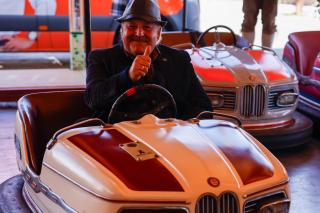
The Oide Wiesn on the southern part of the Theresienwiese has been an integral part of the Oktoberfest since 2011. This year it is taking place in its familiar form for the eleventh time. Nostalgic folk festival attractions, colorful traditional costumes, historical rides, a museum tent with a children's program and festival tents where the focus is on coziness and Bavarian customs make the event an absolute crowd favorite.
Three large festival tents with a traditional program and the Museumszelt are located on the festival grounds. Fans of historic rides will also find real showman nostalgia at the Oidn Wiesn. Here, the “Kettenflieger Kalb” from 1919 spins, the “Dicke Berta” puts muscle power to the test and the “Fahrt ins Paradies” over hill and dale or the 50s hit “Calypso” bring back folk festival memories. Classics such as the boat swing and children's carousel round off the offer alongside historic throwing and shooting galleries - and all at family-friendly prices. All rides can be ridden for just 1.50 euros. Admission to the closed area costs 4 euros per person (aged 15 and over).
Festzelt Tradition: Bavarian customs
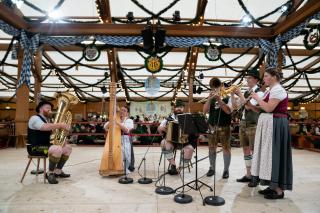
The Festzelt Tradition, run by the Winklhofer and Wieser families, focuses on brass band music and performances by traditional Bavarian costume clubs. Augustiner Wiesn-Edelstoff is served from the wooden barrel in the typical Keferloher.
In the Limogarten with baby carriage parking, children's toilets and nappy-changing facilities, children can tap unlimited lemonade from the Limo fountain for one euro. The Limogarten has been enlarged this year to allow even more families with small children to enjoy a relaxed stay. There is a separate garden area for wheat beer fans.
No minimum consumption is required for reservations in the Tradition tent.
Tent: 5,000 seats
Garden: 2,700 seats
Weißbiergarten: 300 seats
Landlords: Toni & Christine Winklhofer and Peter & Margot Wieser
www.oktoberfestzelttradition.de
The Volkssäbgerzelt Schützenlisl® of the innkeeper family Stiftl
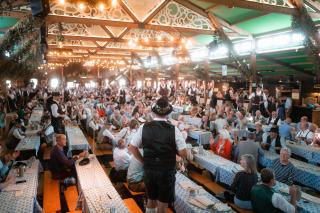
In the Volkssängerzelt Schützenlisl® run by the Stiftl family, the tradition of legendary folk singers such as Weiß Ferdl, Bally Prell, and Hans Blädel plays a major role. Traudi Siferlinger, BR presenter and pub music expert, has put together the music program. Singing along is expressly encouraged.
The menu features specialties from the in-house butcher's shop, Fairtrade products, and vegetarian and vegan delicacies, all of which are regional specialties bearing the Bavarian organic seal or the “Geprüfte Qualität Bayern” (Certified Bavarian Quality) seal. Ninety percent of the products used here are exclusively Bavarian organic products. Augustiner beer is served from wooden barrels in stone mugs and Hacker-Pschorr wheat beer.
The Schützenlisl® festival tent has been recognized as a Munich Ökoprofit business and a climate-neutral festival tent. This year, at the Nuremberg trade fair for organic food, another award was given to the “Bio-Bayern-Wiesn-Revolution” as part of the “30 for 30” initiative by the Bavarian state government.
Tent: 1,384 seats
Garden: 400 seats
Festival hosts: Christine and Lorenz Stiftl
www.stiftl-oktoberfest.de
The musicians' tent at the Oidn Wiesn - The Boandlkramerei
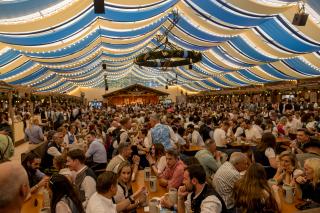
In 2024, the Boandlkramerei was a new musicians' tent at the Oidn Wiesn. The landlord family Peter and Petra Schöniger have 34 years of folk festival experience. Known for the Festhalle Bayernland at the Munich Spring Festival, the Schönigers are no strangers to the Oktoberfest. They have had their own sausage stand at the Wiesn regularly since 1992. Culinary delights from the kitchen will include traditional Bavarian dishes such as chicken giblets, duck legs and knuckle of pork.
Visually, the tent is reminiscent of an old tavern. Raised boxes bring all guests closer to the music and dancing on stage. A white-blue sky frames the festive atmosphere. The new tent for the Oide Wiesn, built in-house, offers space for 2,844 guests. The Oktoberfest beer is served by Augustiner Bräu.
Background:
The Boandlkramer is an urban Bavarian term for death. The Boandlkramerei reflects the humorous character and playful disposition of the Bavarians according to the story by Franz von Kobell: “Die Gschicht von Brandner Kasper” from 1871.
Music program:
Under the artistic direction of Windfried Frey, well-known and popular artists from the folk music scene create the music program. New, young, partly unknown and yet talented folk music groups are also offered a stage. Interested musicians can apply by e-mail at musik@boandlkramerei.bayern.
Tent: approx: 1,700 seats
Garden: 1,100 seats
Hosts: Peter and Petra Schöniger
The Museum tent with velodrome and "Volksfestwelt"
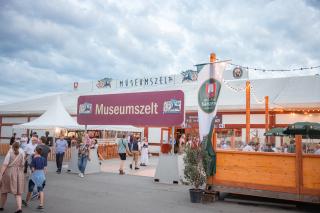
The history of Oktoberfest comes to life in the Museumszelt of the Bavarian Showmen's Association (Historische Gesellschaft Bayerischer Schausteller e.V.). Exhibits from the Munich Showmen's Foundation (Münchner Schausteller-Stiftung), whose collection is housed in the Munich City Museum, invite visitors on a journey through the past. In addition to a replica of the velodrome, there is much to discover. The special exhibition "Jedes Bild ein Treffer! Fotografie auf dem Jahrmarkt" (Every picture a hit! Photography at the fairground) uses artifacts from showmen's booths, photographic equipment, and their images to shed light on various historical practices of photography at the fairground. It is complemented by a commissioned work developed especially for the presentation by Swiss artist Romain Mader.
Children's program in the Museumszelt A varied children's program is available, offering fun for children aged six and above. Every Monday, Wednesday, and Friday (except October 3) from 2:00 p.m. to 6:00 p.m., children can have their faces painted, and every Tuesday and Thursday (11:00 a.m. to 3:00 p.m.) they can marvel at the impressive performances of the clown. Throughout the week, the Förderverein für Bairische Sprache und Dialekte e.V. (Association for the Promotion of the Bavarian Language and Dialects) will be introducing visitors to the dialect, barrel organ players (10 a.m. to 6 p.m.) provide insight into the technology and art of organs, a penny-farthing rider recounts the history of the bicycle and explains its construction, the operators of the Bulldog Rondell present and explain their historic vehicles, and kids can ride crazy bikes in the velodrome. School classes are welcome. The scavenger hunt at the Oidn Wiesn teaches visitors about the history of showmanship. Those who successfully answer all the questions will receive a Wiesn diploma and a small prize.
The museum tent is open from 10 a.m. to 11:30 p.m. Admission is free, and participation in the children's program is free of charge.
Car and motorcycle steep wall show - Original Motodrom
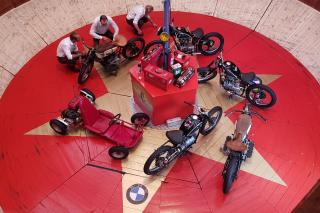
Today's Motodrom is commissioned in 1928 by the Munich showman Josef Ruprecht, a Munich showman. In the film "The Death Arena" by Kurt Meisen (1953), the wall became a film star alongside Richard Häussler, Katharina Mayberg and Friedl Hardt. In 1984 Hugo Dabbert became the new owner of the steep face. He gives it the name "Motodrom", modernizes the wall with a new parade, trucks and high-speed cars and creates "The Motorellos" with a unique program. In 2012, Dabbert hands over the "Motodrom" to Thomas Ottl and Donald Ganslmeier, who run the business today (OW 16).
Oktoberfest posters: Purchase exclusive reprints
Since 1952, the state capital of Munich has been holding a competition for the Oktoberfest poster. The winning design is used to advertise the Wiesn on posters, on the Internet, and on social media, and can be found on the official collector's beer mug and other licensed merchandise. The complete series of posters is on display in the museum tent. Exclusive reprints of the Oktoberfest posters (1952 to 2018) can be purchased at the “Museumsstandl” for €12 per poster.
Replacement for the Calypso: The Geisterhöhle (Ghost Cave)
The Ghost Cave at the Oidn Wiesn is a classic ghost train for the whole family, dating from 1965. It offers an exciting mix of horror and adventure and provides thrills with elaborately designed scenery and spooky effects (Oide Wiesn 13). In 2025, it will replace the Calypso at the Oidn Wiesn, which will thus have a ghost train for the first time.
Holzpfosten-Scooter (Wooden post scooter)
In the southern part of the Theresienwiese there is a "wooden post scooter". This is a classic bumper car, as we know it from the 60s and 70s. With the reactivation of what is probably the only historic “wooden post scooter” in Germany, Richard Müller is contributing to the preservation and revival of a piece of fairground history. The family business Richard Müller can look back on a long tradition dating back to the 16th century. (OW No. 5)
Drinking water fountains
There will be two free drinking water fountains at the Oidn Wiesn again this year. One drinking water fountain is located on Street 6 next to the Boandlkramerei music tent, and another is located at the restrooms at Delivery Point 1 behind the Manfred Zehle GmbH wheat beer bar and the Käfer-Wies'n-Schänke storage areas at the end of Street A.
Circus wagon café
The restored circus wagon from 1970 can seat up to 20 people on historic tram benches. Outside, there are bar tables for a total of around 30 guests. The menu includes traditional Bavarian lard pastries such as Auszogne and apple snails. These are served with coffee, hot chocolate, juice, and organic lemonade (OW 24).
Münchner Marionettentheater (Munich’s puppet theater)
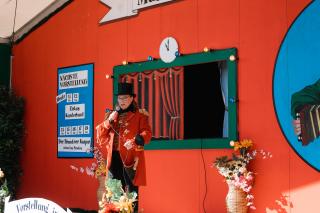
The stage at Munich’s Marionettentheater is another highlight at the Oide Wiesn for big and little ones alike. The history of this venue stretches back to 1858 when Josef Leonhard Schmid requested that the city of Munich appraise his plans to “establish a permanent puppet theater for children”. Today, the theater can be found at 32 Blumenstrasse in Munich. It enjoys ‘travelling’ for the Oide Wiesn, however, where it offers a rich and diverse program with several shows per day. Entry to the theater is free.
At the Old Oktoberfest is free admission from 9 p.m.
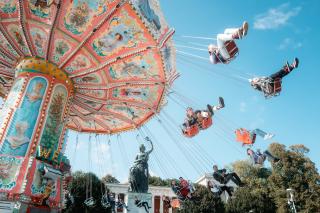
Strolling through the Old Oktoberfest at the end of a leisurely walk without paying admission is possible after 9 p.m. every day. The nostalgic rides continue to make their rounds until 11:30 p.m. at an unbeatable admission price of 1.50 euro. If you want to order something in one of the three marquees, you should hurry, because the bar ends at 10:30 p.m. However, no one will have to down their drink, because the tents will close one hour later at 11:30 p.m. At midnight, the Old Oktoberfest closes its doors.
